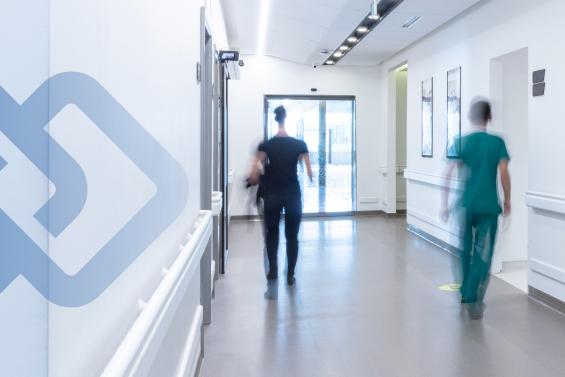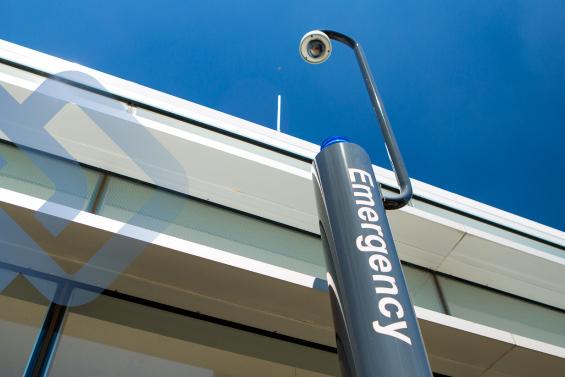- Sales: 0808 196 2872
- Service: 0344 477 9991
- Contact Us
Securing a healthcare facility is absolutely paramount, especially when you’re caring for the elderly or vulnerable. With confidential records, expensive technology, and potentially hundreds of people in the care of your staff, hospitals and medical facilities are among the most in need of effective security solutions.

As one of the leading providers of security services across the UK, we understand the importance and confidentiality of what you do as a healthcare professional, and we provide a service that’s both discrete and robust.
Let’s look at the key considerations for securing a healthcare facility, and why they’re a necessary part of any good NHS security package.
Regardless of the size of your facility, having effective healthcare security is absolutely essential. In fact, studies are showing a distinct rise in the amount of violence towards healthcare workers, particularly post-pandemic.
Hospitals are almost always busy, with thousands of people filtering in and out over the course of a day. This in itself represents a security issue, especially in an environment that’s occupied by vulnerable or sensitive patients.

However, there are multiple other reasons why, as the owner of a healthcare facility, you should be looking at effective solutions for securing and protecting your building and your people.
Safeguarding is often the first reason many facility owners think of when considering an NHS security service. Understandably so – as a medical professional, your first port of call is ensuring and maintaining the safety of those in your care.
This includes those who have severe mental health concerns that could pose a risk to themselves or others (such as schizophrenia or clinical depression), or patients that are bedbound and unable to raise an alarm should an intruder break in.
As you might expect, there’s a few key areas that any healthcare security plan should place an emphasis on. Any main thoroughfares, such as heavily trafficked corridors or an accident and emergency department, are immediately obvious areas for consideration, but there are other areas to be aware of.
Reception areas, for instance, are often hectic and fast-paced, meaning that intruders can often slip past without a robust healthcare security system in place. Outpatient facilities can also be busy areas of a hospital, particularly in larger facilities.
With any medical facility, there’s undoubtedly areas that are off-limits to unauthorised personnel, or that are of a sensitive nature. This could be a staff-only area, or access panels for crucial hospital equipment.
If you’re in charge of a larger or specialist facility, you might also want to limit access to certain wards (such as paediatrics or cancer wards). This could be down to privacy, or (in the case of radiology) safety for staff and patients alike.
These areas are also often highly sensitive and, if accessed by the wrong people, could be disastrous for your facility. Without the right healthcare security, you run the risk of expensive damages, and disruption to your services.
Your restrictions are there for a reason, whether that’s safety or privacy, and implementing solutions that take this into account is vital. This could be through effective hospital security guards, or with rigorous access control that takes advantage of state-of-the-art technology, like biometrics or facial recognition.
The NHS and healthcare industry as a whole is moving to be more up-to-date with the technology it uses. With smart technology becoming more widely available and affordable, and medical tech developing quickly, our healthcare has moved to a contemporary and streamlined system.
However, this move to a more modern approach has meant that medical facilities have started to attract unwanted attention from thieves, especially those who look to deal on the black market.
The obvious countermeasure here is visible, effective healthcare security guards. Time and time again these have been proven to be the most effective way to mitigate against theft and property damage.
Theft from hospitals unfortunately doesn’t stop at expensive technology or equipment – prescription medications and hospital-grade treatments are a key target for thieves. There’s a lucrative underground trade of these, and it piles pressure onto our healthcare system.
While hospital security measures are often in place with ID badges or coded locks, thieves will aim to circumvent these methods, which can lead to huge issues in a loss of stock and, in extreme cases, an inability to deliver the right treatment to patients in need.
Effective healthcare security guards, alongside more sophisticated options for access to medicine storage (such as biometric scanning), are the clear solution for the modern healthcare facility.
Any hospital or clinical facility undoubtedly has reams of patient data and information on file, and older facilities will often have paper records, too. With the advent of GDPR, data protection has never been of more importance, and the same is true of protecting that data through effective NHS security solutions.
Technology already presents a large enough target for thieves, and with that being the primary storage method for patient data, ensuring its security is of the utmost importance.
The ideal way to this is with secure healthcare access systems, such as biometric scanning or facial recognition. Not only are you managing who can and can’t access your data storage, but you’re also setting a strong deterrent in place for any would-be data thieves or trespassers.
Hospitals and clinics can often be volatile, difficult-to-manage places. Tensions are naturally running high, and can occasionally boil over. Healthcare professionals will have doubtless seen this many times before, but it’s not something you should accept as part of your facility.
That’s where effective healthcare and NHS security solutions play an exceptionally vital role in managing the safety of your facility.
Medical security guards who are expertly trained in de-escalating conflict and bringing calm to your clinic or facility are essential in that sense. You’ll be able to rest easy, and dedicate more of your time to caring for patients, managing your facility, and delivering the best possible service.
Hospitals are often large, sprawling areas, with a huge number of areas to consider. This could be a labyrinth of corridors, large grounds and car parking, or simply wards that have plenty of space for patients and beds.
Unfortunately, it’s this expansivity that often means they’re targets for vandalism and criminal damage, as well breaking and entering. Monitoring all areas at once, especially at a larger facility, can often be a daunting prospect.
With healthcare security, you’re able to offer protection and peace of mind to those in your care, as well as reassure yourself that you’ll be able to continue your work without risk of interruption.
While there are undeniably many security concerns for healthcare facilities, there are effective solutions for each of them. Healthcare security is a diverse field, and there are numerous different options available for facilities of every type and size.
Let’s explore some of the more versatile solutions for securing your healthcare facility, and what they can help you protect against.

As a medical professional, you’re already aware of how different hospitals and healthcare facilities can be. Larger facilities will naturally need more extensive coverage, but that doesn’t necessarily mean that smaller clinics are any less complex.
Similarly, if you’re working with particularly at-risk patients (such as those in a care home or mental health facility), you’ll likely need a more robust security system in place than someone who operates a small outpatient facility or clinic.
Ultimately, the level of security and protection you need falls down to many different factors and circumstances, and opting for a healthcare security company that tailors its packages to your specific needs is crucial.
CCTV is arguably what most people think of when they imagine security solutions for their healthcare facility, and for good reason. It’s synonymous with well-protected areas, and offers peace of mind for both visitors and business owners alike.
In a healthcare setting, CCTV works as an exceptionally effective deterrent, monitoring key areas of footfall and keeping key areas of the hospital or clinic free of disturbance or disruption. It’s often the first line of defence for NHS security measures.
Modern security cameras can take advantage of cutting edge technology to detect intruders, with industry leaders like Churchill Support Services able to offer an exceptional response time of just 30 minutes. This, coupled with our pioneering 24/7/365 service, ensures we’re the right choice for any and all healthcare security needs.
We’re also one of very few healthcare security companies UK-wide that are able to offer completely tailormade service, taking into account the size of your facility, your budget, and any points of concern to ensure you can rest easy.
In a similar vein to effective CCTV coverage, posting healthcare security guards at strategic locations around your facility offers multiple, multi-faceted benefits, especially in areas that are heavily trafficked, or that see many different people coming in and out.
It’s been proven time and again that security guards, and especially so those who’ve got field-specific experience, are one of the most effective deterrents. They understand the rigours of NHS security, and can position themselves at key points around your facility in order to maximise their effectiveness.
Not only that, but with specific training in conflict management, hospital security guards are able to manage stressful or volatile situations that can arise in any healthcare environment. This could be angry patients, an unwanted intruder, or staff disputes – each of which can disrupt the calmness you’ll undoubtedly seek to cultivate in your facility.
And, as technology continues to develop, you’re able to request hospital security officers who have access to body cams. This adds an additional layer of protection and safety, and functions as another effective deterrent.
Plus, following your initial healthcare security assessment, you’re able to work alongside your provider to discuss the areas you’re most concerned about, and deploy additional guarding there.
As you doubtless know, hospitals are complex environments. They’ll often have multiple floors, warren-like corridors, and extensive wards and patient facilities. Alongside this, there’ll also be restricted areas, where authorised personnel can access patient records, medicine storage, and other classified spaces.
It’s this balance that further reinforces the need for effective healthcare security, and particularly how you control access to those areas. They’re naturally a target for thieves and trespassers, so effective hospital access control is a must.
This might take the form of electronic locking systems, with ID badges providing access to those who need it, but we’ve noticed much more of a trend towards other forms of access that don’t rely on the more traditional PIN codes, ID badges, or key fobs.
Modern healthcare security eschews these in favour of more sophisticated systems, such as biometric (fingerprint) scanning or facial recognition. This is not only quicker in most instances, it also offers an increased level of hospital security and safety, especially for areas like medicine storage.
If you’re working in a larger or more “spread out” facility, with multiple different points of entry, you already understand the need for mobile guarding in addition to static hospital security guards. While these will be positioned in strategic spots around your facility, mobile patrols offer an additional dimension to your hospital security package.
They’re able to patrol the grounds and outdoor spaces at your facility, as well as walk any necessary corridors and larger areas of your hospital or clinic. In addition to effectively securing your hospital, mobile patrolling offers extra peace of mind and reassurance that your facility’s perimeter is completely secured.
With expert level training in conflict management, and healthcare-specific experience, mobile NHS security can also operate in your hospital wards and departments, providing extra support to stationary guards.
At Churchill Support Services, we’re able to provide custom-built, industry leading security services to a huge range of healthcare and medical facilities. We’re exceptionally proud to uphold the gold standards of the security industry, and we’re in the Top 1% nationwide of all SIA-approved security providers.
With a comprehensive service that covers mainland UK and Northern Ireland, and 27 years’ experience at the very top of the industry, you can rest assured we’re able to provide a tailormade package for your healthcare facility. Get in touch today to see how we could help safeguard your hospital or clinic.